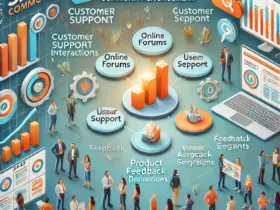Social media marketing is crucial today, requiring strategic planning beyond just posting for likes to effectively engage with your audience.

What is social media marketing?
Social media marketing promotes brands through tailored content, follower interaction, paid ads, and engagement analysis. It involves five key components:
- Strategy: Set campaign goals, choose suitable platforms, and determine content types.
- Planning & publishing: Schedule content for peak times to effectively reach your audience.
- Listening & engagement: Track brand mentions and interact with followers to build relationships and loyalty.
- Analytics & reporting: Review data to gauge audience interaction and adjust strategies for improved outcomes.
- Advertising: Use targeted ads to enhance your organic content and reach potential customers more efficiently.
Benefits of social media marketing
Social media marketing offers numerous advantages for businesses, including:
1. Current trends
The digital world is ever-changing with new trends and products emerging daily. Social media helps consumers stay informed and make better purchasing decisions with the latest updates.
2. Convenience and quick service
Social media marketing allows for easy access to information and products. Consumers can quickly find and purchase items directly from brand pages.
3. 24/7 access
Social media is always available, offering consumers constant access to brand information anytime they need it.
4. Personalized experience
Effective social media marketing delivers tailored content based on consumer interests, increasing engagement and conversions.
5. Market insights
Social media helps consumers explore various products and brands while providing businesses with insights into industry trends and competitors.
6. Quality content
High-quality content on social media enhances consumer engagement and provides valuable information about products and services.
7. Clear product information
Social media offers detailed product information beyond what’s available in-store, helping consumers make informed decisions.
Best social media marketing platforms for businesses
Choosing the right social media platforms is essential for effective marketing. Here’s a look at some of the most popular platforms:
– Facebook: With 2.9 billion users, it’s great for broad outreach and updates.
– Instagram: Over 1 billion users make it ideal for diverse, visual content.
– X (formerly Twitter): Perfect for real-time updates and trending topics.
– LinkedIn: Useful for professional networking and company news.
– TikTok: Excellent for engaging younger audiences with short videos.
– YouTube: The go-to for video content, from tutorials to product showcases.
Steps to create social media marketing strategy
1. Define your target audience
Identify your target audience’s demographics and social media motivations—social interaction, entertainment, or learning—to tailor your marketing. Use social listening tools to refine your buyer personas and create engaging content that addresses their specific needs.
2. Incorporate E-commerce
Leverage social media for direct sales, as many users prefer shopping within social apps. Popular tools include Instagram Shops and Facebook Shops. Build brand trust through reviews and user-generated content, and use ads to drive purchases and increase engagement.
Instagram is an important platform for ecommerce businesses. You can learn more about how to use instagram for business.
3. Optimize for social search
As social media becomes a go-to for brand searches, optimize your social profiles with relevant keywords and consistent usernames. Utilize alt-text accurately and consider YouTube Shorts for better search visibility.
4. Focus on key channels
Select social channels that offer the highest ROI, like Instagram. Prioritize platforms where your target audience is most active and consider integrating your social feed into your website to boost conversions.
5. Repurpose content
Save time and increase reach by repurposing content across platforms. Use existing content in various formats to stay visible and cater to different audience preferences, but avoid overusing it to prevent audience fatigue.
6. Plan for customer service
Implement a strategy for handling customer service via social media, whether through dedicated accounts, auto-replies, or chatbots. Clearly state support hours and response times to manage expectations and improve customer satisfaction.
7. Develop a recipe card
Develop a content calendar to manage and plan your posts. Classify content into categories such as evergreen, promotional, campaign, and recurring types to ensure consistency and monitor performance effectively. Choose platforms that facilitate easy management and collaboration.
Benefits of AI in social media marketing
Personalized content recommendations
When you use AI for content marketing, it suggests content based on user behavior and preferences, using tools like HubSpot and Sprout Social for tailored posts and captions.
Improved search results
AI refines search results for quicker and more accurate information retrieval.
Language translation
AI offers real-time language translation, enhancing global communication.
Spam and malware detection
AI detects and removes spam and malware, ensuring a safer social media environment.
Harmful content moderation
AI identifies and removes harmful content, promoting a positive social media space.
User privacy protection
AI encrypts data and develops methods to protect user privacy.
Ideal customer identification
AI analyzes user behavior to target ideal customers, improving marketing efforts.
Personalized Ad campaigns
AI creates customized ad campaigns based on user interests, boosting performance.
ROI measurement
AI measures marketing campaign results, aiding in strategy adjustments.
Data-driven content creation
AI uses engagement data to create content that resonates with the audience.
Efficient customer support
AI chatbots provide 24/7 support, improving customer satisfaction.
Efficient contests and giveaways
AI manages social media contests and giveaways, including winner selection and prize distribution.
Data-driven strategies
AI analyzes social media performance data to refine content and strategy.
Final Thoughts
Social media marketing is vital for modern businesses and requires more than occasional posts. Mastering targeted content, regular scheduling, proactive engagement, thorough analytics, and focused advertising helps fully leverage social media platforms.
Selecting the appropriate platforms and using artificial intelligence for personalized recommendations, efficient support, and accurate ROI measurement can further boost marketing efforts. Adopting these strategies guarantees a dynamic and responsive method for connecting with and expanding your audience.





